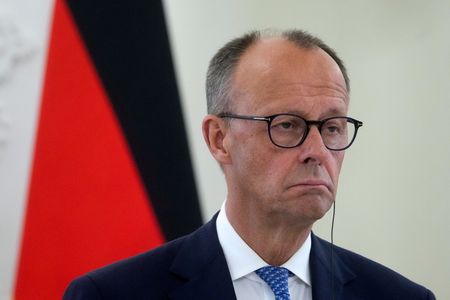By Andreas Rinke and Sabine Siebold
VILNIUS (Reuters) -Germany and its NATO partners are prepared to defend every inch of the alliance’s territory, Chancellor Friedrich Merz said on Thursday at a military ceremony in Vilnius to mark the establishment of a German brigade in Lithuania.
The thousands-strong brigade on NATO’s eastern flank is part of European efforts to strengthen the region’s defences in response to Russia’s invasion of Ukraine and pressure from U.S. President Donald Trump on allies to invest more in their own security.
“Anyone who challenges NATO must know that we are prepared. Anyone who threatens an ally must know that the entire alliance will jointly defend every inch of NATO territory,” Merz told delegates at a roll call for the new 45 Armoured Brigade.
“Protecting Vilnius is protecting Berlin,” he added, telling a crowd of cheering onlookers waving paper flags for the two nations that Lithuanians could count on Germany.
Merz was joined at the ceremony by his Defence Minister, Boris Pistorius, as well as Lithuanian President Gitanas Nauseda, who said Russia and Belarus had conducted military exercises on his country’s border.
The three Baltic states, linked to NATO’s main territory only by a narrow corridor known as the Suwalki Gap, are considered one of the regions most vulnerable to a Russian assault.
The German brigade will be headquartered in Rudninkai, near the capital Vilnius.
Some 400 German military staff personnel have already moved to Lithuania to set up the brigade, which will comprise 4,800 troops and 2,000 vehicles, including dozens of tanks, when it will be fully operational by the end of 2027.
INVESTMENT BOOM
Merz said Russia was a threat to European peace and order, through its war in Ukraine and its hybrid attacks across Europe, including espionage, sabotage and cyber-attacks.
Germany is aware of its own responsibility, Merz said, promising to modernise the Bundeswehr, Germany’s long-neglected army, a pledge his predecessor Olaf Scholz also made after Russia’s invasion of Ukraine in February 2022.
“Our goal is to provide in future all financial means necessary for the Bundeswehr to become Europe’s strongest conventional army,” Merz said.
Since 2017, Germany has led a multi-national battle group in Lithuania, one of four such combat units set up by NATO in the Baltic states and Poland to bolster its eastern flank following Russia’s annexation of Crimea in 2014.
As part of Germany’s pledge to modernise its armed forces, the country in March loosened its constitutional debt brake to fund a surge in defence spending.
German Foreign Minister Johann Wadephul also backed Trump’s demand to hike NATO’s defence spending to 5% of GDP.
NATO estimates indicate that Germany’s defence spending was 2.12% of GDP last year, up from 1.19% in 2014.
Lithuania, which is expected to spend more than 3% of its GDP on defence this year, has announced plans to hike defence spending to over 5% of GDP from next year, partly to pay for the construction of the base for the incoming German troops, estimated at over 1 billion euros ($1.1 billion).
($1 = 0.8840 euros)
(Reporting by Andreas Rinke and Sabine Siebold, Writing by Rachel MoreEditing by Madeline Chambers and Barbara Lewis)











